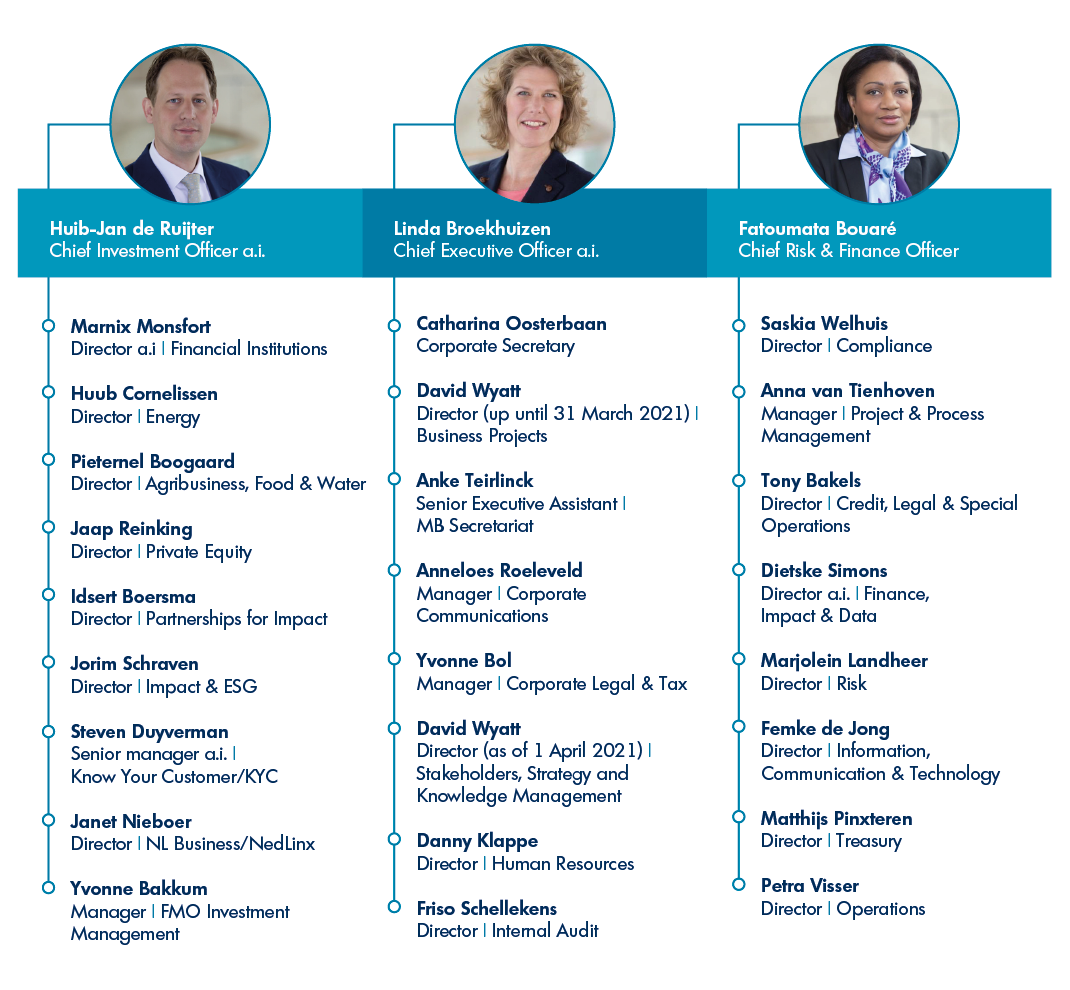Governance structure
FMO’s corporate governance structure is based on the premise that FMO is a long-term partnership of stakeholders who, directly or indirectly, influence or are influenced by the achievement of our objectives. Stakeholders include customers, the Dutch government, shareholders and other providers of capital, employees, NGOs and local communities in the countries where we work, as well as partners.
FMO is expected to take the interests of all stakeholders into account at all times. In governance terms, this expectation is expressed through the responsibilities and accountability of the Management Board and Supervisory Board with regards to our shareholders and other stakeholders.
The Management Board of our bank consists of the Chief Executive Officer, the Chief Risk & Finance Officer and the Chief Investment Officer. They were formally responsible for the management of our bank and were appointed by the Supervisory Board.
F. (Fatoumata) Bouaré | L.G. (Linda) Broekhuizen | H. (Huib-Jan) de Ruijter |
Chief Risk & Finance Officer | Chief Executive Officer a.i. | Chief Investment Officer a.i. |
Ivorian (Ivory Coast), 1966, female | Dutch, 1968, female | Dutch, 1976, male |
Appointment in current position 2017-2021 | Appointment in MB position: 2014-2018, 2018-2022 | Temporary appointment: 2020 |
Other positions: | Other positions: | Other positions: |
No other positions. | 1. Member of the Board of Directors of EDFI (association of bilateral European Development Finance Institutions) | No other positions. |
During 2020 it was deemed best to abolish the 10-person Executive Committee (ExCo), which was responsible for the day-to-day management of the company between 1 January 2020 until 1 August 2020. The ExCo consisted of the members of the Management Board, the Director Debt, the Director Finance, Impact & Data, the Director Human Resources, the Director Impact & ESG, the Director Partnerships for Impact and the Director Stakeholders, Strategy & Knowledge Management. Establishing the ExCo was a response to the growing pace of change in our markets, the growth of our organization and the need to engage more actively with a larger number of stakeholders. These issues remain and the Supervisory Board and the Management Board have been looking into expanding the Management Board from three to five persons.
FMO’s Supervisory Board supervises and advises the Management Board. New members of the Supervisory Board are appointed by the General Meeting of Shareholders on the nomination of the Supervisory Board. The Supervisory Board currently has three committees: the Audit and Risk Committee, the Selection, Appointment and Remuneration Committee, and, as of 1 July 2019, the Impact Committee, which advises and prepares decision-making. The Impact Committee allows the Supervisory Board to give more attention to this topic. The Committee deals with subjects such as ESG (including human rights), impact strategy, impact measurement, (NGO) stakeholders and communication, audit, reporting and international developments regarding impact.
Appointments of members of the Supervisory Board and Management Board are subject to the approval by the Dutch Central Bank, which assesses the reliability and suitability of candidates. FMO organizes extra training where necessary and offers a Lifelong Learning Program to all its members.
Organizational chart
